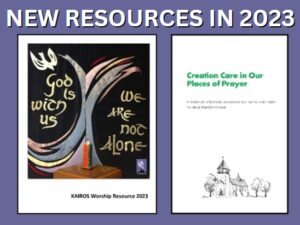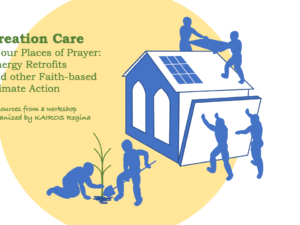Spirited Reflection: Fruit Trees and Nuclear Weapons

September 26 is the International Day for the Total Elimination of Nuclear Weapons – and in 2018, this is an exciting day. In recent years, the international focus on nuclear weapons has shifted away from the security concerns of nuclear-armed states, and turned instead to the humanitarian consequences of nuclear weapons. This shift has allowed a consideration of the horrific effects of the development, possession, testing, and potential use of nuclear weapons. Happily, the shift has also surfaced interests and voices that are often otherwise marginalized in nuclear security conversations, such as women and indigenous peoples.
In 2017, the International Campaign to Abolish Nuclear Weapons (ICAN) led a civil society coalition in leveraging this new emphasis into the Treaty on the Prohibition of Nuclear Weapons, adopted by the United Nations General Assembly in July 2017. The Nuclear Ban Treaty, as it’s often called, establishes a global norm against nuclear weapons, placing them in a similar legal category as chemical and biological weapons. ICAN won the 2017 Nobel Peace Prize for their remarkable accomplishment.
Ratifying the Ban
The job now is to get enough countries to ratify the Ban so that it can enter into force (at the time of writing, this means 35 additional states). It may come as no surprise that Canada and the United States are vehemently opposed to the Ban. But their rhetoric is revealing, at once reviling the Ban as dangerous and destabilizing while demeaning it as meaningless. The truth is that both nations are afraid of the deeply moral norm that the Ban establishes, which would require reworking of NATO security commitments and, in the case of the US, phased nuclear disarmament. Getting to this point is obviously a long and arduous task. But it’s one where the church should be leading.
Nuclear weapons debuted in human history in 1945, so it’s no surprise that they’re nowhere in the Bible. There’s no simple Scriptural prooftext to apply to them. But that doesn’t mean that Scripture has nothing to teach us on the subject. In Deuteronomy 20:19, buried among God’s instructions for how the Israelites are to wage war, there’s an obscure divine command about how to besiege a city. During a sustained siege, the Israelites may cut down trees to build siege engines. But they’re not allowed to chop down fruit trees – because, as the venerable King James Version has it, “thou mayest eat of them, and thou shalt not cut them down (for the tree of the field is [human] life) to employ them in the siege.”
The command is as confusing as it is obscure; most modern translations render the explanation as “are the trees of the field people, that you should war against them?”. But the translation variant that the KJV uses makes more sense, given the attention paid to fruit-bearing trees. The fruit tree is the life of human beings, and you shall not cut them down to employ them in your war.
The principle of apple and fig trees
There’s a principle here, in the prohibition against using apple trees for battering rams, that speaks to our nuclear situation. The force of the Deuteronomic command speaks against our human tendency to treat our present situation and conflicts, whatever they may be, as if they were final, apocalyptic concerns – justifying any sacrifice and any means of resolution. The Israelites were clearly going to be tempted to imagine that the conquest of this town, this city, was all that mattered – so go ahead and chop down all the trees to make it happen.
But the voice of Scripture pushes back against this temptation. Human beings are, after all, like the grass of the field. We are here today, gone tomorrow. In protecting fruit trees from the excesses of war, Scripture reminds us that our conflicts are not exhaustive. Whatever the war, there will be a time for peace that follows. And times of peace need fruit trees that must not be sacrificed in the time of war: “they will all sit under their own vine and their own fig-tree, and none shall make them afraid” (Micah 4.6). In other words, whatever conflict consumes our sin-sick hearts in the present day, we should not presume to let it consume the future.
This Biblical teaching fits nicely with the current focus on humanitarian consequences of nuclear weapons. And it offers Christians a sense of how and why the total elimination of nuclear weapons is not simply one more cause among many, but a commitment that is a natural outgrowth of our faith. Today, call or write to your MP. Tell them that, as a Christian, you want Canada to sign the Nuclear Ban Treaty, and then do the hard work of aligning its security commitments accordingly. And visit icanw.org to sign up for the global movement to ban nuclear weapons forever.
Tyler Wigg-Stevenson is an Anglican priest and a veteran advocate for nuclear weapons abolition. He is the author of several books, including The World is Not Ours To Save. Tyler and his wife, Natalie, a theologian, live in Toronto with their three daughters.







